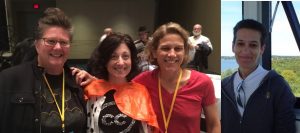Keene State College begins its Open Pedagogy Faculty Learning Community (OPLC) this Spring 2017 semester. I am very grateful for the generous support of the Keene State College Faculty Enrichment, Faculty Fellow program, and excited to facilitate this learning community together with KSC Instructional Consultant, Chris Odato.
From the time that I first began learning about it, the Open Education movement, to me, seemed uniquely poised to be part of a range of solutions to the numerous problems facing both higher education and our society in general. Centralizing the political context of Open Ed has always been part of my thinking about it. But since November 2016, it seemed especially critical. As I sought to recruit faculty for the OPLC in December I sent the following email:
*******
Dear faculty colleagues,
As our country faces more and more uncertainty, many of you have asked yourselves, what can I do about it? How can my role as a professor or someone who works with college students have a greater impact in influencing our larger culture? Some of you might join me in wondering how higher education has lost touch with a public that seems to increasingly undervalue us and can even be outright hostile.
Open Pedagogy is not a panacea, but it does offer some unique possibilities to address these questions. Open Pedagogy is part of the larger Open Education movement. Teaching in the Open is about building connections and community. It is about connecting students to a larger world and making the process of education more transparent, understandable and accessible. Open Pedagogy also deeply prioritizes the concept and value of students constructing their own learning process. While it involves the use of the web and some easy-to-learn technological tools, it is not about the technology itself. Practitioners of Open Pedagogy actively critique and confront the industrial and corporate approach of co-opting and packaging ‘teaching technology’ to turn students into consumers. Instead, they utilize the as web a place for uncontrolled discovery, creativity and analysis, and as a venue for dialogue with the wider public. Students need faculty who can facilitate and support this learning process. When students can work within a ‘Domain of their Own’, the web offers unlimited potential. Open Pedagogy can be utilized in any type of class, regardless of discipline.
Some OP practitioners have said:
“Openness …can mean that students see themselves as actively building their learning, not simply being recipients of someone else’s version of it.” Audrey Watters, Founder of Hack Education
“…networked learning is not about digital tools, but about the dream of the public commons. And that’s not about new high-tech modes of connection but about community-driven communication and the empowerment of diverse public voices.” [Open Pedagogy can] “help teachers develop practices that allow students to critique and contribute to the knowledge economy.” Robin DeRosa, Chair of Interdisciplinary Studies, Plymouth State University
“Education is inherently an ethical and political act.”- Michael Apple (HT Catherine Cronin, National University of Ireland, Galway)
Reasons to join the OPLC:
- because you don’t have time NOT to join in on these critical conversations
- because you are interested in critically engaged pedagogy
- because this is not about technology, it is about students and teachers and learning
- because the world is changing and you want to change with it, and help direct that change
- because you believe that putting students at the center of their learning makes them take ownership and care more deeply about what they are doing
- because online isn’t going away, even if you choose to stay offline
**********
I was very happy to have received many enthusiastic responses and a surprising number (to me) of faculty ready to commit to meeting every other week on a Friday! We are fortunate to have faculty from Sociology, English, Women’s and Gender Studies, Communication, Education, Music, Environmental studies, Library, Biology, Chemistry, and Physical education. I feel very honored to be a part of this grassroots, faculty-driven initiative at Keene State College!
In our planning, I also sought resources from Tweeps, Followees and Open Ed experts on Twitter. I was blown away by the number of generous responses and retweets of my call for help- what an amazing group. I gathered a list of those resources together and share them HERE. A huge THANK YOU to Maha Bali, Gardner Campbell, Samantha Veneruso, Christian Friedrich, Laura Gogia, Catherine Cronin, Simon Thomson, George Station, Bonnie Stewart, Rajiv Jhangiani, Dan Blickensderfer, Alan Levine, Jeff McClurken, Jamison Miller, Mariana Funes and Robin DeRosa. This list (in an open google doc) is a work in progress, please add anything to it that you think would be helpful!
Open Pedagogy Learning Community Resource List
We are also planning an Open Education Speaker Series for this spring that includes Robin DeRosa, Andrew Rikard, Erika Burke, Martha Burtis and Bonnie Stewart. Details and Periscopes to come soon!
I promise to report back later on our progress and as our plans develop. Stay tuned! Also follow us on Twitter at #KSCollab
The ‘we’ and ‘our’ in any of the statements above refer to the
Open Ed Keene Dream Team:
Jennifer Darrow (@gobman) KSC Academic Technology Director Extraordinaire
Celia Rabinowitz (@crabinowitz) KSC Dean of Library and Awesomeness
Robin DeRosa (@actualham) Goddess of all things Open, and our USNH colleague (yeah that’s right, and Jenny, Celia and I feel like we won the megabucks colleague lottery!)
Karen Cangialosi (@karencang) Faculty member and rebel rouser
Left to right: Karen, Robin, Jenny and Celia





